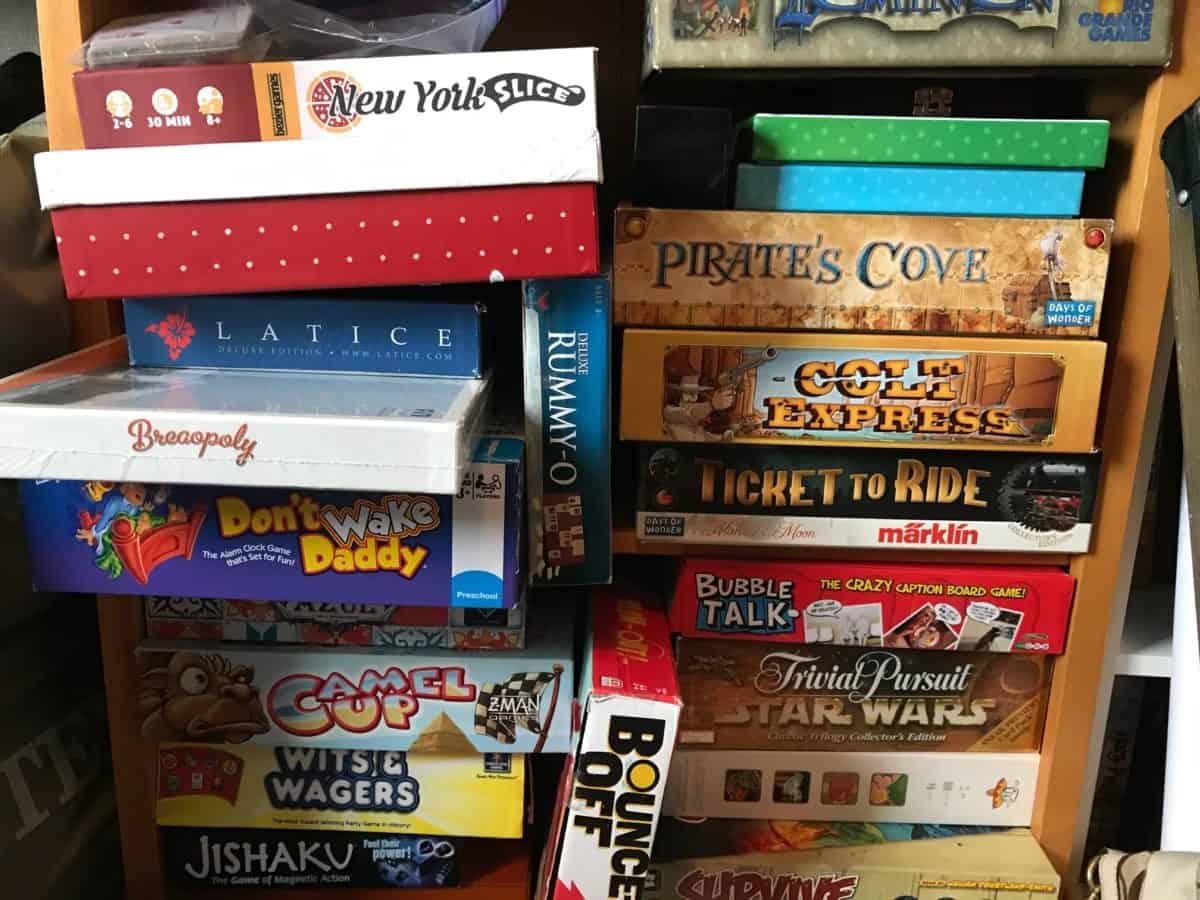Sometimes the hardest part about getting something done is getting the momentum going. Not knowing where to start can cause you to feel lost and without any way to get your bearings. We developed this guide to spark your creative thoughts and give you direction. It’s not going to be perfect and it certainly won’t contain every avenue that can be wandered to get the creative juices flowing. We’ve broken it down into steps, though, not all need to be followed; and there really isn’t any specific order they need to be taken in. You can pick and choose which you like and don’t like.
So what are the common steps we follow when coming up with a board game idea?
- Play a lot of board games. No, a ton!
- Open the parameters to other types of games
- Pay specific attention to what you do everyday
- Brainstorm with others; people better than you!
- Read creative books
- Watch Specific movies
- Find a place outside in nature and observe
- Think back to the good ol’ days
- History WILL help
For lists of our very favorite games out there, follow this link. I’m telling you that these are some of the best board games ever invented. Browse through and see what these board game creators have developed and why their games are so fun. And if you see one that you don’t have, help us out and click on the affiliate link. It makes these types of articles possible! For the rest of you, get ready for the creative juices to start flowing. We’ve got some great stuff ready for you!
1) Play a lot of board games. No, a ton!

Some of you may think that this is an obvious suggestion; and it might be. But so many people play board games without thinking about how they were developed and what is actually happening in the games. They just know they like a game and so they play it. But make sure to 1) play tons of board games and 2) really think about them and what is going on. It can spark lots of ideas for your own.
Specific game elements
There may be a specific element or two from a board game that you just love. It may even be the thing you like most about the game—and everything else about the game you are indifferent about. You could take this element and expand it into an entire game. It’s like using a magnifying glass and using it to expand that very specific detail that is so great. With so many games out there and so many elements incorporated into each game, the options with this strategy are endless.
Already awesome game themes
Similarly to specific game elements, is finding a game theme that you really enjoy. Some games can start off on a great foot just by a unique, or well integrated game theme.You can evaluate which games you like and why you like them. Obviously one reason is likely to be that you enjoy the things you do in the game—but it can also be due to how the game feels and how it looks. Pay attention to the themes games you already play; there may be a gem there that can get your game started.
Board game mash up
Are there a few games that you really enjoy parts of that could be pieced together? Are there two board games you can mash up to create a unique one? Just by adding two mechanics together from two separate games, you could create something that is like no other. Look at the games you play? Is there any way to develop a new theme from the others?
2) Open the parameters to other types of games
Video games might help
Video games can be a great source of ideas for potential board games. They are rich with challenges, difficult scenarios and working together to accomplish an objective. Video games can get you out of your usual brainstorming element, and into a different mindset. They present various scenarios and situations that you may not have otherwise been able to conjure up with your own imagination. Many people have put hundreds of hours on each game to make a beautiful and entertaining experience; now you have access to it all to alter and manipulate it how you want.
Another point to mention is that many video games are designed to be played in multiplayer. In other words, they are also games in which players interact and play with each other. Sometimes the games are competitive and other times they’re cooperative. Some video games even have “mini games” within them that can be the beginning point of a board game. A great example is the Mario Party games that have been so popular over the years. There are hundreds of those that could give great starting ideas for you.
Lawn games and more
Video games and board games are only the beginning of the various games in the world. Outside games like lawn games are a great example of a place to start. They tend to be simple and competitive. Like so many other ideas we’ve mentioned so far, one or more can be the building blocks of a very fun board game you create.
Obviously sports can be another great source to look at for game ideas. Simplifying certain aspects of a sport or changing a few rules can make it a unique idea. Then all you have to do is adapt it to work for a tabletop game.
3) Pay specific attention to what you do everyday

Look into your job
If you have a really interesting job, then there may not be anything left to explain. But for those of you that think your jobs may not be interesting—something about them might be. Do you do anything throughout the day that might be challenging or interesting in board game form? Is your job cutthroat? Does it have a million layers of bureaucracy? Do you have to be especially tactful when dealing with angry customers? Are you competing with someone else (or with yourself) to sell more, or doing something better, than you did the day before? Look at these things with a game-maker’s perspective. You’ll be surprised at what you see.
Evaluate free-time activities
What do you do in your free time that might be a fun thing you can adapt to a board game? People tend to have interesting and varied hobbies. What do you enjoy doing that can either be turned into a competition or into a cooperative campaign? If you go skydiving or bungee jumping, it might be a bit easier to come up with some ideas. If you’re into blowing glass or crochet, it might be a bit more challenging; but don’t lose heart. Azul is an extremely popular game and it’s about stained glass.
Real life but rare
Another route to take if you can’t think of something on the previous topics is to use real life scenarios that are less ordinary. For example, you can use things like disease outbreaks, terrorist attacks, and natural disasters as themes and structures to build upon. Admittedly, these are much more dark topics than other ones we’ve suggested so far, but they can also be great ideas. After all, Pandemic fits this description and people love it!
4) Brainstorm with others; people better than you!
You are great at what you do. But let’s be honest, none of us are good at everything. And that’s a good thing. The world would be pretty boring if we all were great at everything. Even if you are good at thinking things up yourself, finding another brain that thinks differently can help.
Bouncing ideas
Who can you sit down with that is bursting with creative ideas? And we don’t just mean creative game ideas. Some people have some creative gift that easily enables them to think of things immediately that others can spend hours working on, and never truly develop into something real. Identify someone like this and start telling them your vision. You may be surprised what you find. It may be just the spark you need to find the perfect idea for your game.
Really bouncing ideas
As you probably already expected, the next idea would be to get together with a group of people. I am always shocked at how quickly an idea can develop when you get six or seven people together with focused attention brainstorming different variations and possibilities for any topic. All you have to do is pose a question to the group and let it take off. You may have to nudge it on occasionally; but for many groups, there’s enough creativity in the room to turn an idea into magic. Then it’s time for you to get to work on fine tuning the idea.
Take a leap
When doing one or two of the previous suggestions, you may find someone that could be a huge asset to you and your game. If they are responsible, and someone you know you can count on, ask them to join the venture. It may make this process much easier. You can continually bounce ideas off of one another—and always be on the same page. You can divide the tasks so that you are sharing the load.
5) Read creative books

It may sound stupid, but reading more can definitly get the creative juices flowing. Fictional books can be especially helpful because they are all about imagination. Think about it; someone literally invented the entire thing. It was something that never existed, and someone pulled it out of thin air.
Reading a book with that in mind can really get you thinking about what is possible and what you can accomplish yourself. Though it’s not limited to that; reading self-help books, non-fiction books and so many other genres can get the gears turning in your head and get some serious momentum going.
6) Watch specific movies
As you could have predicted would come after the suggestion to read more books, the next idea is to watch cool movies. If you’re like me, reading is great, but seeing, hearing and feeling things unfold in a movie are a much richer experience. You can find various scenes in movies that can single handedly create the theme or foundation for a game. But you just have to find the right kinds of movies.
Some of the most useful types of movies that I use to come up with ideas are anything futuristic or technologically advanced. For example, science fiction movies also get my creative mind moving a million miles an hour. There are so many things you can do with space ships, futuristic gadgets and robots.
Other types of moves that work are ones you may not naturally think about. Movies set sometime in history can be good; especially movies from the medieval times. Castles, knights and kingdoms just have special appeal to people for some reason.
Another potential idea would be to sit down and watch a kid’s show with your son, daughter, niece, nephew, or other minor family member. Since these shows are often animated that are full of imagination. Piggy back off of the work that they have put in and look for ideas there. They are everywhere.
7) Find a place outside in nature and observe

Sometimes the calm of being out in nature, with no one around—and especially no technology around—can make all the difference to get you thinking. Take a blanket and a notepad out for a few hours and see what comes to mind. Not only are there no distractions, you have fresh air and potentially a nice relaxing breeze to help you brainstorm. If you haven’t done this in a while (or if you have never done this at all) you’ll be surprised to find out how peaceful it is and how clear your thoughts can become.
The other thing that can help while outside is seeing nature in the works. You may see some animals, insects, and plants that can spark a winning idea for a board game. After all, you don’t have to develop it all on the spot; it really just has to be the beginning of an idea. You can work on the rest later. But being out in nature gives you the opportunity to see bees humming, squirrels collecting and even larger animals grazing. You never know what ideas may follow.
8) Think back to the good ol’ days
You were young once
Think back to when you were young. Were there any games you used to play that could be adapted to a board game? Things as simple as freeze tag, capture the flag and hide and seek can be a springboard into a much more interesting idea. It can be especially useful if you have a game from your childhood that you loved, that isn’t nearly as common as the others we’ve listed.
Before they were games
Were there board games that your family played growing up that you’ve recently seen on a store shelf somewhere? Or is there a game that you know your family and friends invented, but you never packaged up into a game—but someone else did? We’ve all been there.
Balderdash, spoons, telestrations and many others were invented long before the board games came around that we know today. Think back to those types of games you may have played and think about how they could be made into a game. Even if they have to undergo a transformation to be in actual board game form, it may be well worth doing. There would likely be less development work for you with one of those ideas.
9) History WILL help

History may just be the most useful suggestion we could give you; and there are several reasons why. There are hundreds of thousands, if not millions, of historical events that can be turned into games if you just found out about them. Think about some of the most popular games today. Some of them are directly based on historical periods or events we all know about.
Big historical events/things
Even on this list you are likely to find far too many things than you have time to learn more about. War, scientific discovery, kingdoms, societies, cultures, processes and so many more things can be learned, harnessed and turned into a game that everyone will love. So watch a biography, read a history book or talk to an old person; do whatever you have to to find the golden ticket idea. Obviously, there are lots of movies that are loosely based on historical events—these can be some of the best idea-sparking resources.
The almost was
You can also use things that didn’t actually happen to your advantage as well. There are lots of tragedies, wars, heroic moments, and inspiring things that almost happened; but for one reason or another, they never materialized. Or conversely, there are things that did happen that could have been stopped.
This is exactly the type of exciting setup for a board game. You can develop a game that can be about stopping the tragedy, or create an alternate scenario if an event had played out differently. An example would be if the US hadn’t entered World War 2. Would everything have played out the same way? Maybe, but there are another million scenarios that could have played out as well. Think about historical events that DID happen and think about what could have been different. Think about historical events that might have happened if drastic actions weren’t taken.
Obviously, our rich world history provides endless possibilities for board game ideas, but it doesn’t end there. The universe is much bigger than that. There are many ideas that could be developed with other planets, galaxies, asteroids and rocket ships that would be well worth exploring.
Examples from board game world
There are many examples of awesome games that follow along this path. Specific countries, cultures and cities have been the catalyst for some awesome game ideas.
One specific example of a board game company that does a great job using history to create their games is Facade Games. They have a collection of games in what they’ve named as the Dark Cities Series. Each game’s theme is developed after a specific city’s dark history. Their first game in the series, for example, is called Salem 1692. In it, players assume roles as people in the town during the Salem witch trials. Players attempt to seek out the witches and identify them, all while avoiding being accused themselves. It perfectly encapsulates the witch trials in game form. If you haven’t checked out Facade Games yet, check out their website here. It’s well worth it.
Conclusion
We hope this list of ways to discover and develop board game ideas has been helpful. Though we think this is a good list of ways to do that, it certainly isn’t the only way to do it. Use your awesome skills to find other unique ways to think of board game ideas. The more unique the development process, the less likely it is that someone else has already thought about the same idea. Good luck!

